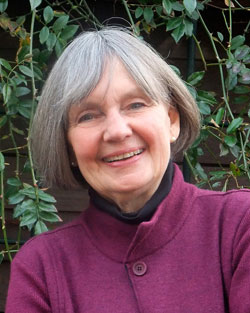
| Vol.
XXVI No.
1 September / October 2013 |
| contents |
| Printable Version |
In Memoriam
Pauline Maier

The History Faculty will feel very different this fall without Pauline Maier. It will seem more subdued without her exuberant laugh, and poorer in less immediately apparent ways without her wealth of experience and her generous engagement. To a great extent our department is her creation – the product of her high professional standards. We were all hired on her long and vigilant watch. She was department head for many years, and those of us who followed her always bore in mind her expectations with regard to commitment, integrity, and scholarship (and if we occasionally forgot, she would remind us).
Pauline's presence was genial as well as bracing. She liked her colleagues and enjoyed spending time with us; she told me that that was the main reason that she attended search dinners. She understood that life included more than work, important as work was to her, and sympathized with the challenges of balancing professional obligations with those of family, whether in the form of young children or of aged parents. (But balance was important; she felt that dedicating a first book to parents predicted continued professional activity, since that required writing a second one to dedicate to a partner.)
Her interests and enthusiasms were broad and varied, and she happily shared them.
She was an energetic gardener and planted on an awe-inspiring scale at her Rhode Island farm; her colleagues often enjoyed its fruit and vegetable bounty. She was an aficionado of cheese, and a talented cook. She was devoted to her dogs, as well as to the human members of her family.
The many published notices that appeared after her death appropriately emphasized the importance and distinction of her scholarly work on early American history. The generosity that characterized her relationships with colleagues and students at MIT was also evident in her writing, which, no matter how arcane and weighty the subject, addressed the general reader as well as the scholarly specialist (with striking success – for example, American Scripture, her book about the Declaration of Independence, was featured at Costco). It was also expressed in ways less visible from the Institute. Pauline's expansive sense of the audience for history led her to engage with groups of high school teachers. And we were not the only colleagues who benefitted from her learning, her intelligence, and her wisdom.
Along with the formal obituaries appeared a flood of very moving posts on blogs and listservs by younger scholars from around the country, who had appreciated her high standards and valuable advice, whether they first encountered her as a formal reader of a submitted manuscript, or at a lecture or conference. So our loss is very widely shared, but our corridor will be especially quiet.
| Back to top | |
| Send your comments |
| home this issue archives editorial board contact us faculty website |